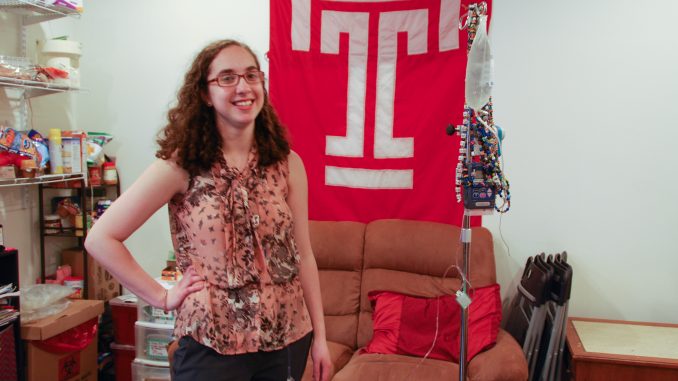
Joan Fanwick is afraid of eye-drops, but she has no problem with using steroids, hooking herself up to an IV and taking a low-dosage chemotherapy pill, along with 10 other medications each day.
Fanwick, a senior early childhood education major, has an extremely rare form of Sjögren’s syndrome — a chronic autoimmune disease that often affects the salivary glands, leading to excessive drying in the eyes and mouth.
In Fanwick’s case, it affects her entire body. She experiences extreme fatigue, chronic joint pain and an impact on her nervous and autonomic systems, which affects her blood vessels and internal organs like her heart and digestive tract.
Her diagnosis turned her into a political advocate. She speaks out against President Donald Trump’s plans to repeal the Affordable Care Act because she calculated that without her current coverage under the ACA, Fanwick’s medical bills would cost more than $50,000 per year — much more than the college senior can afford. Earlier this month, Fanwick’s health struggles were featured on Seventeen magazine’s website.
By studying at Temple, Fanwick goes against the advice of her doctors, who wanted her to withdraw after she got her feeding tube during sophomore year. They also encouraged her to leave school last year when she developed a blood infection.
“One of the reasons [I fight so hard to stay in school] is because I do have a chronic illness,” she said. “It’s not going to go away. There’s no end date. I’ll be on immunosuppressants probably my whole life. That’s the reality of it. I didn’t want to risk taking time off and getting behind and not being able to return back to school. That wasn’t an option in my mind.”
Along with classes and student-teaching, Fanwick’s normal day includes taking 10 to 15 pills. One of her medications is an immunosuppressant drug — the equivalent of a low chemotherapy dose. She’s used to setting up her feeding tube and hooking herself up to IVs through the port located in her chest.
Fanwick received her diagnosis last year at age 20 after 10 years of chronic joint pain and orthopedic problems, resulting in double hip surgery during her teenage years.
The ACA is the only way she is able to pay for treatments, she said. She is not covered by her parents’ health insurance because their plan only covers doctors from her home state of Connecticut. Fanwick’s disease is so rare that it requires specialists, most of whom are based in New York City.
“[My disease is] not usually this severe or life-threatening, so people don’t take it that seriously,” Fanwick said. “I’m in the 10 percent that has nervous system involvement and the 2 percent of that which include autonomic involvement, so like cardiovascular, digestive and other internal organs.”
The severity of Fanwick’s health care concerns is uncommon among students. Mark Denys, the senior administrator of Student Health Services, said a repeal of the ACA would not have a substantial impact on most students who use Temple’s health services.
“The only thing we use insurance for is to get blood drawn or medications or if we have to refer them to a specialist,” Denys said.
He said the most common cause for a visit to SHS is cold and flu symptoms, which require a $10 rapid strep test for strep throat.
“We’ve had a couple [students concerned about a potential repeal of the ACA], but definitely not an overwhelming number,” Denys said. “A few folks that get their medications from us and are afraid that that might go away, but it’s very few.”
Fanwick hopes that by sharing her story and personalizing the disease, representatives like Sen. Pat Toomey — whose office she often calls — are more likely to vote to keep the ACA in effect. She is also working with an advocacy organization called Health Stories Project to create a video to help others understand the severity of her disease.
She added that many people — even people who have less severe cases of Sjögren’s syndrome — don’t understand her health care struggles.
“It’s a little terrifying sometimes,” she said. “Because you think that if you put a face to it, then people will care more. But especially the article from Seventeen was also posted on Yahoo, and the Yahoo comments were like insane. A lot of people saying that it was ‘fake news’ and I was like, ‘No, this is my life.’”
“There really is no plan B, which is a little scary,” Fanwick added. “If I wasn’t able to get the life-saving treatments that I currently get, I would be wheelchair- and bed-bound. School wouldn’t be an option.”
Megan Platt can be reached at megan.platt@temple.edu.


Be the first to comment